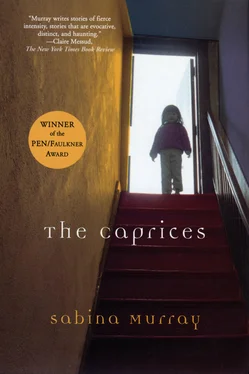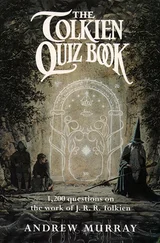Sabina Murray
The Caprices
I would like to thank Don Hymans, Heidi Pitlor, Valerie Martin, and the Bunting Fellowship Program at the Radcliffe Institute of Harvard University.
I am grateful to my husband, John, and son, Nicholas, and to the rest of my family, without whom I would not have been able to write this book.
THIS COULD BE any village street. The packed dirt could cover any country road, and the dust that rises in billowing sheets, lifted by the lazy hands of the dry season, could menace any provincial town. It is three o’clock in the afternoon, but no children wander back from school. The Chinese shopkeeper’s door has been shut for nearly a year, but no matter, since the children will not bother him for moon cakes, sweet wafers, and candied tamarind. A kalesa driver sits idly by his cart; his horse, unperturbed by the state of affairs, dozes behind blinkers, flicking rhythmically with his tail, one rear hoof casually cocked to bear no weight. In response to a fly, the horse shakes his head, jangling gear and whipping his mane from side to side. The fly rises up, buzzing at a higher pitch.
What you are witnessing is war.
A woman in a faded floral shift slowly makes her way down the sidewalk. She carries two huge woven bags; one is full of vegetables, the other holds a few canned goods and some dried fish, although a year ago this bag would have been full of meat. The woman has black hair, which she has pulled into a tight bun. Even streaks of gray (a new appearance this last year) break through the black. Her face is thin. She clenches her teeth with the effort necessary to carry her load. She sets down her bags, takes a deep breath, then manages a few more steps. The faded cloth of her dress is damp with perspiration. She wears a scarf wrapped around her neck, which must be uncomfortable in this heat. She sees the kalesa. She waves, then calls. The driver lifts his head. He was dreaming. The beautiful washerwoman was offering him a rice cake. The cake was blue. She was smiling at him with perfect teeth. “This is for you,” she said. The beautiful washerwoman moved her hips from side to side. She smiled slyly. “Take the cake. .”
And then the sight of Mrs. Garcia waving at him down the street. She can barely manage.
It is 1943.
Imagine, a woman of such standing carrying her own groceries, there on the street, bareheaded in the early afternoon heat. Imagine all that gray hair, overnight, it seems. He closes his eyes again; sadly, the beautiful washerwoman is gone. He pulls himself to his feet.
“Oo po,” he shouts, although lazily, in Mrs. Garcia’s direction. Oo po —the polite greeting, but the driver manages to make it sound like an insult. What will she do, this woman? She isn’t wealthy anymore. She is merely someone who was once wealthy, which is still worth something — she has held on to her house. He pats his horse’s dusty shoulder. What sentimental urge has made him keep Diablo alive? He knows the horse will be stew meat within a month or so. How can he feel sorry for his horse when his brother and little son are dead? It is easy to feel sorry for a horse, even easy to feel sorry for Mrs. Garcia, who has never had to carry bags before.
Trinidad watches her grandmother paying the kalesa driver. Auring, the maid, is standing at the gate. She tries to carry one of the bags, but can’t even get it off the ground. Auring is very old although she does not know her age. She remembers the great typhoon of 1852. She tells Trinidad about it — the carabao lifted off the ground as if God himself had reached down and carried it off, how Mr. Pedrino’s great-grandfather was decapitated by a piece of flying tin while chasing his hat. Auring was Mrs. Garcia’s nanny, which is all well and good, but she is not much use as a maid. Trinidad jumps off the window ledge. She runs down the broad mahogany stairs.
“Ija , don’t run,” her grandmother says, but her voice is rundown, and Trinidad can sense that she really doesn’t care. “Call Jose.”
But Jose is standing in the doorway. He walks in the awkward, dragging motion dictated by his clubfoot. He hooks his arm through the handles of one bag, then grabs the other with his good hand. Trinidad stares, as she has been told not to. Just a forefinger and a thumb like a little bird’s beak on his bad hand. Jose can’t even make them touch, these two pathetic digits. He wiggles them toward each other constantly. Trinidad wonders what would happen if they did touch, what magic this would cause.
“Trinidad,” her grandmother warns her, and Trinidad looks down at the toes of her shoes. She begins edging backward up the stairway. “Trinidad, what are you doing?”
“I am praying,” she lies. “I am praying that God will see how good I have become, and return Nanay and Tatay. I am praying that the Japanese will go back to Japan.” And Trinidad will go back to Manila. She will walk between her parents on Saturday afternoons as they make their way to the cinema to watch an American movie. Vivien Leigh. Gary Cooper. Trinidad tells herself this, even though she knows her parents are dead. Now, Trinidad can only go to mass with her grandmother and the ancient maid. She walks in the middle and Auring leans on her. When Auring does this, Trinidad surreptitiously pinches her arm. And Auring never complains. Close to a century of servitude has taught her that much. They go to Santo Tomas with its paint-chipped idols — Santa Teresa, San Jose. Trinidad is a city girl. She does not want to die in this dusty provincial town. She does not even want to turn twelve here, and her birthday is only two months away.
Manila is dead.
Yesterday, Thursday, Trinidad found that her doll had suffered a haircut. She brought the doll to her grandmother. “Jose did it.”
“How can you prove it, ija? ”
“Who else?”
Mrs. Garcia knows that her granddaughter is right, but she is frightened of Jose — his deformity would scare anyone. She is also grateful to him. The Japanese have looted all the other large houses in the town. When they came to claim her house, they saw Jose dragging himself across the parquet floor with his head cradled in the crook of his shoulder — that hook of a hand pulling him along through the air, as if it anchored and reanchored him to an invisible weight. He frightened the Japanese. Who knows what they squawked at each other? But she knew. They saw the house and they wanted it; they saw Jose and they didn’t. The Japanese thought the very walls were diseased.
Sergeant Shori checks that the lock on his bedroom door is secure, then unbuttons his jacket and carefully hangs it up in preparation for a siesta. Sergeant Shori is not accustomed to having so many people hate him. He is a schoolteacher. He has slender white hands that are good at painting, good at playing the piano. Now they carry a gun. He likes modern women with short hair. He likes opera, except for Puccini, who he feels is overrated. He likes European food. He hates the Philippines and often wonders why the emperor doesn’t let these frightening aborigines have it back. Twice he has contracted malaria. Twice he has been sniped at and nearly killed, once when he was relieving himself in a banana grove. Shori is scared that the other officers will find out that he is weak, although he has no problem with his actual weakness. To keep them from suspecting, Shori says things that are particularly cruel. He has said, “I would like the hand of a Filipino to take back to my father as a souvenir,” although the thought of this disgusts him. He says, with feigned enthusiasm, “I would gladly die for the emperor,” instead of the usual “I would die for the emperor,” not realizing that the “gladly” is what gives him away. Shori is a frightened man. He feels his countrymen have gone mad in this land of rot and horror. He only speaks to deceive them with his false loyalty. Secretly, he feels that he has been transferred from Manila because he does not get along with the other men. His is a solitary post.
Читать дальше












